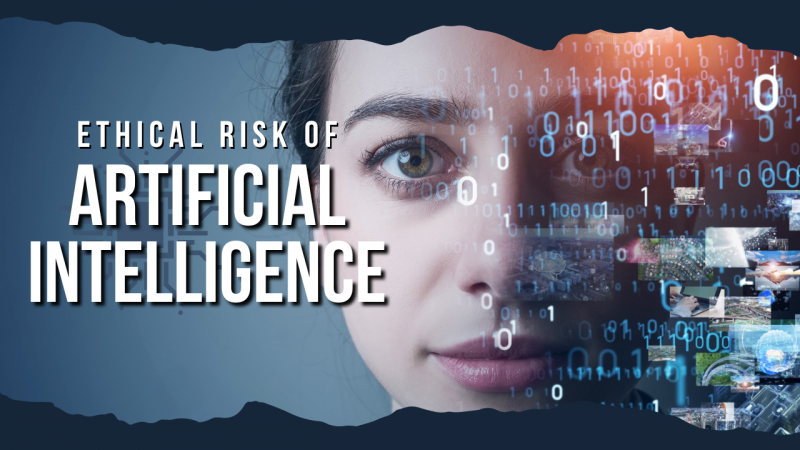
What Are the Ethical Risks of Artificial Intelligence (AI)?
By Business Training Media
AI systems are built on data, and the quality of the data used to train these systems is critical in determining their accuracy and reliability. However, data is often collected from biased sources or reflects existing societal biases, which can lead to biased AI systems. For example, an AI system designed to assist in hiring decisions may be trained on historical data that reflects biases against certain groups of people. This could result in the system unfairly screening out qualified candidates who belong to those groups, perpetuating biases in the hiring process.
Bias in AI systems can also affect decision-making in areas such as criminal justice, healthcare, and finance. For instance, an AI system used to determine an individual's creditworthiness may rely on data that is biased against people from certain neighborhoods or ethnic backgrounds, leading to unfairly denied loan applications. In healthcare, biased AI systems could lead to misdiagnosis or delayed treatment for certain groups of patients, while in criminal justice, biased AI systems could result in wrongful convictions or unfair sentencing.
To address the issue of bias in AI systems, it is essential to ensure that the data used to train these systems is diverse, representative, and unbiased. This requires careful consideration and monitoring of the data sources used, as well as ongoing testing and evaluation of the AI systems to identify and address any biases that may arise. Additionally, ethical guidelines and standards for AI development should prioritize fairness and non-discrimination to prevent biased outcomes. Ultimately, the responsible use of AI depends on the recognition and mitigation of ethical risks such as bias, ensuring that the benefits of AI are shared equitably across society.
Artificial Intelligence (AI) is transforming the world in many ways, from healthcare and finance to transportation and education. AI has the potential to create numerous benefits for society, such as increased efficiency and productivity, improved decision-making, and enhanced safety. However, AI also poses several ethical risks that need to be addressed to prevent unintended consequences.
One of the primary ethical risks of AI is bias.
AI systems can be trained on biased data, which can result in unfair and discriminatory outcomes. For example, if an AI system is trained on historical data that contains biases against certain groups of people, such as women or minorities, it may perpetuate those biases in its decision-making processes. This can result in discriminatory outcomes, such as denying job opportunities or loans to certain groups of people.
Another ethical risk of AI is privacy.
AI systems can collect and analyze vast amounts of data about individuals, such as their personal preferences, online behavior, and even biometric data. This data can be used to create highly targeted advertising or personalized recommendations, but it also raises concerns about privacy and surveillance. If AI systems are not designed with privacy in mind, they could be used to violate individuals' privacy rights or enable mass surveillance.
A third ethical risk of AI is safety.
AI systems can be used in high-risk situations, such as self-driving cars, military operations, or healthcare. If these systems are not designed and tested properly, they could pose a risk to human safety. For example, if a self-driving car's AI system fails to recognize a pedestrian, it could result in a serious accident. Similarly, if an AI-powered medical device malfunctions, it could harm patients.
Another ethical risk of AI is job displacement.
As AI systems advance, they might be able to carry out tasks that previously required humans, like data analysis or customer service. While this may result in increased efficiency and productivity, it could also lead to significant job losses, particularly in industries that rely heavily on routine tasks. This could have a significant impact on the economy and society as a whole.
Finally, there is a risk that AI could be used for malicious purposes. AI systems could be used to create sophisticated cyberattacks, spread disinformation, or even develop autonomous weapons. As AI becomes more advanced, it may become increasingly difficult to control and regulate its use, particularly in the context of national security and international relations.
To address these ethical risks, it is essential to establish clear ethical standards and guidelines for the development and deployment of AI systems. This includes ensuring that AI systems are designed and tested with privacy and safety in mind, that they are transparent and accountable, and that they are free from bias and discrimination. It also means investing in education and training programs to ensure that individuals have the skills and knowledge needed to navigate the complex ethical issues surrounding AI.
While AI has the potential to create many benefits for society, it also poses significant ethical risks that must be addressed. By taking a proactive and collaborative approach to AI development and deployment, we can ensure that AI is used in a responsible and ethical manner that benefits everyone.
Would you like to delve deeper into artificial intelligence? Explore the artificial intelligence online courses available in the eCourse Training Directory, featuring offerings from leading training providers and industry experts. Start your journey to improved communication today!
Copyright 2023 - Business Training Media
Join Our Free HR Training Solutions eNewletter
Join our free HR Training Solutions eNewsletter today to stay up-to-date on the latest industry trends, training and development programs, best practices, and expert insights. Gain valuable knowledge, enhance your skills, improve your organization, build productive teams and elevate your career. Don't miss out on this invaluable resource – sign up now for our free HR Training Solutions eNewsletter!

50 Activities for Promoting Ethics in the Organization - PDF Download
This collection of activities employs a variety of training methods including case studies, quizzes, hand-outs, buzz groups, role-plays, panels, assessments and more to make it easy to address the sometimes intimidating topic of “ethics” in the workplace.





